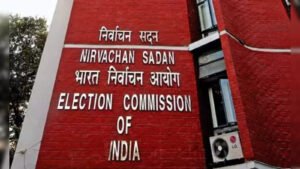
Introduction about New Election commissioners
- The three-member selection panel, led by Prime Minister Narendra Modi, recently appointed two former Indian Administrative Service (IAS) officers, Gyanesh Kumar and Sukhbir Singh Sandhu, as election commissioners.
- This decision holds significant implications for India’s electoral machinery and governance landscape.
Appointment Details:
- The appointment comes amidst a critical period for the Election Commission, which was operating with just one member, chief election commissioner Rajiv Kumar, prior to these appointments.
- Gyanesh Kumar, a retired Union secretary for cooperation, and Sukhbir Singh Sandhu, former chief secretary of Uttarakhand, bring extensive administrative experience to their new roles.
Vacancies Addressed:
- The sudden resignation of election commissioner Arun Goel and the retirement of election commissioner Anup Pandey had left the Election Commission with vacancies, which these appointments now address.
- The addition of seasoned administrators like Gyanesh Kumar and Sukhbir Singh Sandhu is expected to bolster the functioning of the Election Commission.
What constitutional rules apply to the appointment and role of Election Commissioners?
- The Election Commission of India (ECI) comprises a three-member body: one Chief Election Commissioner (CEC) and two Election Commissioners (EC).
- According to Article 324(2) of the Constitution of India, the President of India appoints both the CEC and the ECs.
- Article 324(2) also grants the President the authority to determine the number of Election Commissioners, excluding the CEC, as deemed necessary.
- Election Commissioners receive salaries and allowances equivalent to those of the Judges of the Supreme Court of India.
- The term of office for both the CEC and ECs is six years from the date of assuming office or until reaching the age of 65, whichever occurs first.In cases of disagreement between the CEC and other ECs, resolution is based on the majority opinion.
Context of Appointment:
- These appointments come amid ongoing debates surrounding the independence and autonomy of the Election Commission, especially with the 2024 Lok Sabha polls on the horizon.
- The Election Commission plays a crucial role in ensuring free and fair elections across India’s parliamentary constituencies and enforcing the Model Code of Conduct to prevent the misuse of government machinery and divisive rhetoric during electoral campaigns.
Coinciding Events:
- The announcement of these appointments coincided with the submission of a report on simultaneous elections by a high-level panel headed by former President Ram Nath Kovind.
- The committee’s recommendation to synchronize Lok Sabha and state legislative assembly elections, followed by timely elections for municipalities and panchayats, underscores ongoing discussions about electoral reforms aimed at enhancing governance efficiency and political stability in India.
Conclusion:
- The appointment of Gyanesh Kumar and Sukhbir Singh Sandhu as election commissioners marks a significant step towards strengthening India’s electoral infrastructure.
- However, it also highlights the importance of transparent and inclusive selection processes to uphold the integrity and independence of electoral institutions.
- As India prepares for crucial electoral milestones, such appointments carry profound implications for the country’s democratic fabric and governance landscape.
People also ask
Q1: How are Election Commissioners appointed in India?
Ans: Election Commissioners in India are appointed by the President, as outlined in Article 324(2) of the Constitution. The Chief Election Commissioner (CEC) and Election Commissioners (ECs) are chosen by the President based on their discretion.
Q2: What is the composition of the Election Commission of India (ECI)?
Ans: The ECI consists of three members: one Chief Election Commissioner (CEC) and two Election Commissioners (ECs).
Q3: What is the tenure of Election Commissioners?
Ans: Both the Chief Election Commissioner (CEC) and Election Commissioners (ECs) hold office for a term of six years from the date they assume office or until they turn 65, whichever comes first.
Q4: What are the powers and responsibilities of Election Commissioners?
Ans: Election Commissioners are responsible for overseeing the conduct of elections in India and ensuring the adherence to electoral laws. They play a crucial role in maintaining the integrity and fairness of the electoral process.
Your point of view caught my eye and was very interesting. Thanks. I have a question for you.
Can you be more specific about the content of your article? After reading it, I still have some doubts. Hope you can help me.
Your point of view caught my eye and was very interesting. Thanks. I have a question for you.
I don’t think the title of your article matches the content lol. Just kidding, mainly because I had some doubts after reading the article. https://accounts.binance.com/bn/register?ref=UM6SMJM3